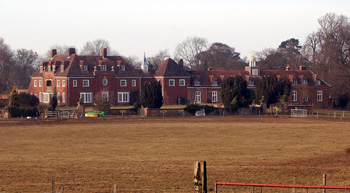John Harvey VI

Ickwell Bury from Warden Road March 2010
On the death of John Harvey VI in 1879 the Bedfordshire Mercury (19th April) ran the following article: "Mr. John Harvey, to whose recent death we briefly alluded last week, was born in 1815, four years before the death of his father, Mr. J. Harvey, of Ickwell Bury in the parish of Northill. His mother was Susannah, daughter of Mr. W. Gibbard of Sharnbrook House and to her careful training and Christian influence the only son no doubt owed much of his amiability and excellence of character. After having been for several years a pupil of the Rev. J. Taddy, then the much respected rector of Northill, he proceeded to Trinity College, Cambridge. At the early age of 24 he was called upon to serve the office of High Sheriff, and four years later he was placed in the Commission of the Peace for the County. After having occupied the deputy-chair for several years he was chosen, on the death of Mt. T. C. Higgins, to succeed him as Chairman of Quarter Sessions; and the admirable manner in which he fulfilled the various important duties of this post for nearly 20 years has made his name conspicuous in the annals of Bedfordshire. The remarkable consensus of testimony to the worth of his character and the value of his services contained in the speeches of his brother magistrates at the Quarter Sessions on the subject will more than bear out our remarks: and when it is observed that the tribute of respect paid to his memory proceeded from gentlemen of quite opposite political views the value of it becomes so much the more apparent. In a county paper it seems almost superfluous to dwell upon the merits of one whose name has become so familiar in connection with a long and honourable career of public usefulness; for he has indeed proved how many ways a country gentleman, instead of resting upon ancestral dignity and hereditary position, can turn his talents and influence to the best account by employing them for the benefit of the community at large; and in this respect Mr. Harvey, like his friend the late Col. Higgins, has left an example which we may hope the rising generation will strive to emulate. Mr. Harvey was no professional philanthropist whose efforts were chiefly devoted to producing an effect by sensational platform addresses; but like his illustrious predecessor on the magisterial bench, seeing a wide field for the exercise of well-directed charity open before him, he entered upon it in a spirit of faith and resolution not unworthy even of John Howard himself. We allude particularly to his persevering exertions in mitigating the sufferings of pauper lunatics and introducing a more humane and rational treatment of the insane, both at home and in foreign countries. And here we should not fail to notice Mr. Harvey's kindly and persevering labours in providing a fund for the assistance and encouragement of discharged prisoners, which have, we believe, been attended by the most satisfactory results. For many years Mr. Harvey had been well-known as an enthusiastic yachtsman and was one of the oldest members of the Cowes squadron. In the Claymore he had visited most parts of the World; and his gallant conduct off the coast of Tyre, when he was instrumental with the French fleet in saving that town and the lives of its Christian inhabitants during the war in Syria in 1860, will long be remembered in yachting annals; and was mentioned with strong expressions of approval in both Houses of Parliament. Many of our religious and educational societies have lost in him a liberal supporter. He was much interested in archaeology and on two occasions hospitably received the members of the CountySociety to which he belonged at Ickwell Bury on their annual excursion. He was several times chosen as one of the Lay Representatives of his Rural Deanery at the Ely Diocesan Conference. His public engagements, however, were not allowed to interfere with due attention to the calls of home interests. He was a zealous promoter of elementary education in his own village; and in the administration of large parochial charities, as in other good works, he was always ready to co-operate with the rector. Mr Harvey married in 1842 Annie, daughter of Mr Henry Tennant (who has been well-known for some years as the accomplished writer of "The Cruise of the Claymore" and other popular works), and leaves an only son, captain in the 42nd Highlanders, and on the staff of his Excellency the Governor-General of Canada, and one daughter.